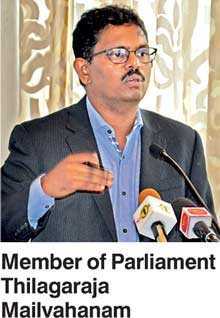Thursday Feb 26, 2026
Thursday Feb 26, 2026
Monday, 18 June 2018 00:00 - - {{hitsCtrl.values.hits}}
By Charumini de Silva
 Parliamentarian Mylvaganam Thilakarajah called on the Government to conduct comprehensive research on the controversial palm oil cultivation that is taking over the plantation sector in Sri Lanka, insisting that it would trigger a serious socioeconomic conflict if not addressed in the immediate future.
Parliamentarian Mylvaganam Thilakarajah called on the Government to conduct comprehensive research on the controversial palm oil cultivation that is taking over the plantation sector in Sri Lanka, insisting that it would trigger a serious socioeconomic conflict if not addressed in the immediate future.
Speaking at the first national dialogue to shape a set of conclusions for a policy blueprint on the future of work in the tea plantation sector in Sri Lanka, organised by the International Labour Organisation (ILO) last week, he asked for research to be conducted before stepping into the palm oil industry.
“I am not against or for palm oil but what I want is that there must be perfect research in going forward. We have research institutes for tea, rubber and coconut which help industry stakeholders in the way forward. However, there is no research done on palm oil,” he added.
He also charged that there were many RPCs that were currently engaged in outsourcing without any approval from the authorities.
“We need to discuss how the outsourcing can be done at a higher policy level such as in Cabinet and in Parliament. Without discussion in Parliament, the Labour Ministry, Plantation Ministry, the RPs are continuing the outsourcing, affecting the people engaged in this sector,” he claimed.
Labour migration from the tea industry was highlighted as a major challenge, with him noting that the 500,000 workers that were engaged in the industry in 1992 had now drastically reduced to 160,000 workers, while tea smallholders in the country amounted to 400,000 employees.
“In going forward it is important to decide whether we are going to leave it out completely to the smallholders or work out a strategy to retain the estate workers without disturbing their livelihoods,” he added.
In addition, he said that reviewing the wage issue every two years had also become “seasonal”, with stakeholders unable to reach a consensus on the matter.